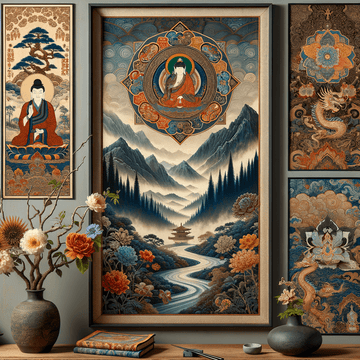The Influence of Nature in Traditional Asian Art Styles: Exploring Chinese Ink Painting, Thangka Painting, Ikebana, and Batik Designs | Metal Poster Art
Oct 26, 2024

Exploring the Influence of Nature in Traditional Asian Art Styles
An immense cultural sphere with an interesting way of looking at the world vast and natural, Asia has repeatedly demonstrated fascinating art styles. Each Asian culture implements unique art forms which showcase their history, values, beliefs, and most notably, their relationship with nature. Whether it's the graceful ink wash painting from China, the immaculate Thangka paintings from Tibet, the mesmerizing Ikebana arrangements from Japan, or the stunning batik designs from Indonesia, nature serves as a vital inspiration.
Nature as a Symbol
In the Asian worldview, nature is featured as a meditative symbol. This is evident in the popularity of landscape art and the recurrence of flora and fauna in Asian artwork. Mirroring the natural world in art is seen as a conduit to the harmony of the universe and moral resolvement. It also serves as a reflection on how one should conduct one's life - calm, resilient and thriving against all odds.
Chinese Ink Painting
Originating in China during the Tang Dynasty, inkwash painting, also known as "literati painting" is a practice that appreciates the vigor and romance of nature. Capturing the essence and spirit of nature in landscape sceneries, this expressive painting style has deeply influenced other Asian art forms, including Japanese and Korean.
Thangka Painting from Tibet
Thangka painting, a classic Tibetan Buddhist art form, derives inspiration from the tranquility and sacredness of the Himalayas. These intensely detailed and color-saturated paintings often depict deities and mandalas amidst serene natural surroundings, symbolizing man's connection to nature and the universe.
The Elegance of Ikebana
Ikebana, the fascinating art form from Japan, embodies the beauty of nature within flower arrangements. With an emphasis on shape, line, and form, it illustrates the stages of life. Every stem, leaf or flower is artistically presented, highlighting the asymmetrical balance and fostering a meditative space.
The Colorful Batik Designs of Indonesia
Indonesian batik art, UNESCO-listed for its cultural significance, illustrates the rich biodiversity of the region. Using a resist dyeing technique, artists create intricate natural motifs on fabric. Batik art expresses harmony, balance, and the enduring beauty of the natural world.
The influence of nature in traditional Asian art illuminates the intrinsic bond between humans and the outside world. It promotes the values of harmony, balance, endurance, and offers a tranquil refuge from the chaotic modern lifestyle. Consequently, artists and enthusiasts alike continue to gravitate towards these art forms, maintaining their relevance even today.
Interested in exploring more art like what we've discussed today? Our collection offers a diverse range of styles, including Thangka Painting (Tibetan)and beyond. Feel free to dive into our world of artistic wonders by visiting https://metalposterart.com/collections/thangka-painting-tibetan. Whether you're looking to admire or to acquire, there's always something captivating waiting for you. We're excited to share our passion for art with you.







